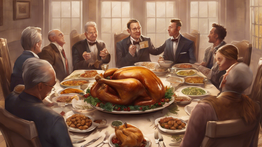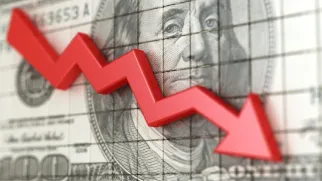
How To Square the Circle in Biden’s Tale of Two Economies
Joe Biden's portrayal of the U.S. economy as thriving contrasts sharply with public sentiment, a divide best understood through the lens of the Common Man CPI.

Joe Biden's portrayal of the U.S. economy as thriving contrasts sharply with public sentiment, a divide best understood through the lens of the Common Man CPI.

U.S. Steel had been losing market share for decades. It’s now being taken over by a foreign rival—the result of slow strangulation by government.

Inflation has left millions of Americans with no good choices, even when it comes to necessities like what to eat.

Those who don’t cut back on their Thanksgiving plans will have to cut back elsewhere in their budgets or turn to their credit cards for a lifeline.

How we got here is a lesson in excessive government spending.

The war on inflation is over,” economist Paul Krugman, a New York Times columnist, wrote recently on X/Twitter. “We won, at very little cost.”

Baby boomers on fixed incomes who rented their entire lives and planned to do so in retirement are now facing rental prices for which they never budgeted.

With the appropriations fight in Washington in overdrive, and a barely avoided government shutdown behind it—for now—Congress should be paying attention to the latest economic data now more than ever. Recent revisions show things are actually worse than previously estimated. In fact, both the American consumer and the

Joe Biden's portrayal of the U.S. economy as thriving contrasts sharply with public sentiment, a divide best understood through the lens of the Common Man CPI.

U.S. Steel had been losing market share for decades. It’s now being taken over by a foreign rival—the result of slow strangulation by government.

Inflation has left millions of Americans with no good choices, even when it comes to necessities like what to eat.

Those who don’t cut back on their Thanksgiving plans will have to cut back elsewhere in their budgets or turn to their credit cards for a lifeline.

How we got here is a lesson in excessive government spending.

The war on inflation is over,” economist Paul Krugman, a New York Times columnist, wrote recently on X/Twitter. “We won, at very little cost.”

Baby boomers on fixed incomes who rented their entire lives and planned to do so in retirement are now facing rental prices for which they never budgeted.

With the appropriations fight in Washington in overdrive, and a barely avoided government shutdown behind it—for now—Congress should be paying attention to the latest economic data now more than ever. Recent revisions show things are actually worse than previously estimated. In fact, both the American consumer and the
